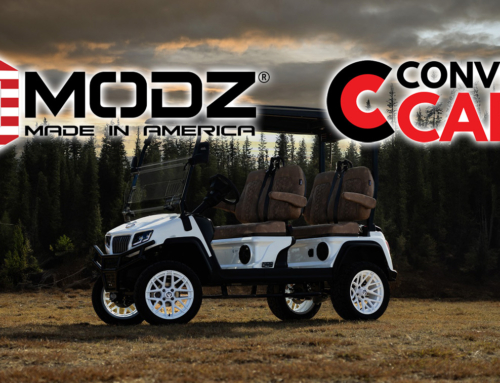A golf cart and a low-speed vehicle, also known as an LSV appear the same upon first glance; however, the two of them are different in numerous ways.
Unless it has been modified, a golf cart can go up to 20 miles per hour. A low-speed vehicle can reach speeds of 25-30 miles per hour.
Golf carts, as opposed to LSVs, are not DOT, and DMV approved because they don’t have the necessary features to be street worthy. These include:
- Headlights
- Brake lights
- Turn Signals
- Seat belts
- Advanced braking systems
Low-speed vehicles are equipped with each of these features; therefore, they are street legal.
What Are the Delaware Golf Cart Laws?
In Delaware, it is illegal to drive a golf cart on a public road. Golf carts can only be driven on private property. Because golf carts are only driven on private property, the age to operate one would be up to the property owner’s discretion.
Because golf carts are not street legal, the driver can only go as far as the end of the owner’s property.
Alcohol should never be consumed while driving a golf cart or any other vehicle; however, since the golf cart is being operated on private property, there are no DUI laws in place.
What Are the Low-Speed Vehicle Laws In Delaware?
You can legally drive an LSV on public roads, as long as the speed limit is no higher than 35 miles per hour. Also, they cannot be driven on dual highways.
To legally drive an LSV on public roadways, the vehicle would need to have brake lights, headlights, turn signals, seat belts, appropriate tires, and an advanced braking system. If your LSV doesn’t have these features, you wouldn’t be able to register it with the DMV. A registration is necessary to operate on a public roadway.
To legally drive an LSV, you must be at least 16-years-old and a licensed driver. Because your LSV will have the necessary lights, you can legally drive it at night.
While driving, you need to have your license, registration, and proof of insurance.
Alcohol is strictly forbidden while driving an LSV. It is also illegal to operate an LSV while under the influence. If you are pulled over for drinking, you can be arrested for a DUI.
If you allow your underage child to drive an LSV and they are involved in an accident, you would be held financially responsible for any damage that has occurred. Also, you could be arrested for endangering the welfare of a child. It is essential that you don’t allow an underage child or a teen without a license to operate an LSV in Delaware.
Learn more at Delaware Department of Transportation
What You Need for the Delaware Department Of Motor Vehicles To Register An LSV
To be able to register an LSV in Delaware legally, you are going to need to bring a number of things.
First, you will need to bring your valid driver’s license. Next, you will need to fill out the MV2009 form completely. You will also need to bring proof that your LSV has been inspected.
You must have insurance to register an LSV legally, and you will need proof of insurance when you go to the DMV.
A Division inspection technician must certify your Vehicle Identification Number (VIN). This inspection will cost $15.
You will also need to bring the title if you have one, and the manufacturer’s Statement of Origin/Certificate of Origin.
The laws in Delaware regarding driving a golf cart and an LSV are very different. If you are considering purchasing either type of vehicle, you should consider the capacity in which you are going to use it. If you simply want to drive around your property, a golf cart will suffice. If you’re wanting to drive on public roadways, you should go with a low-speed vehicle.







